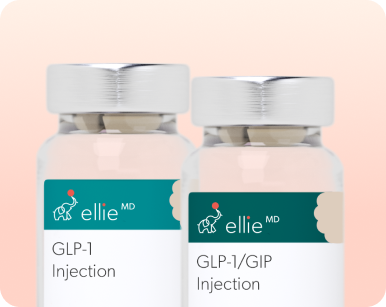
We are more than a telehealth platform.
The EllieMD Program is a community-powered ecosystem integrating an expert doctor network, dedicated partner pharmacy, and prescription-grade personalization.
2x
Better results*


By combining clinical precision with community support, we aim to make a lifetime of health and longevity accessible to all.
200k+
Wellness journeys


We are more than a telehealth platform.
2x
Better results*
The EllieMD Program is a community-powered ecosystem integrating an expert doctor network, dedicated partner pharmacy, and prescription-grade personalization.


By combining clinical precision with community support, we aim to make a lifetime of health and longevity accessible to all.

200k+
Wellness journeys


Weight Loss
Empowering You to
Reach Your Health
Goals.
Empowering You to Reach Your Health Goals.


Sexual Health
Ignite Your Passion and
Experience a Deeper
Connection and
Fulfillment.
Ignite Your Passion and Experience a Deeper Connection and Fulfillment.


Support+
All-In-One Protein for
Strength, Digestion,
and Wellness.
All-In-One Protein for Strength, Digestion, and Wellness.


Microdose
GLP-1s: Small Doses,
Big Difference.
GLP-1s: Small Doses, Big Difference.


Longevity
It’s Not Just About Living
Longer. It’s About Living
Better.
It’s Not Just About Living Longer. It’s About Living Better.


Skincare+
Glow Confidently with
Science-Backed Skincare.
Glow Confidently with Science-Backed Skincare.


Weight Loss
Empowering You to
Reach Your Health
Goals.
Empowering You to Reach Your Health Goals.


Microdose
GLP-1s: Small Doses,
Big Difference.
GLP-1s: Small Doses, Big Difference.


Sexual Health
Ignite Your Passion and
Experience a Deeper
Connection and
Fulfillment.
Ignite Your Passion and Experience a Deeper Connection and Fulfillment.


Longevity
It’s Not Just About Living
Longer. It’s About Living
Better.
It’s Not Just About Living Longer. It’s About Living Better.


Support+
All-In-One Protein for
Strength, Digestion,
and Wellness.
All-In-One Protein for Strength, Digestion, and Wellness.


Skincare+
Glow Confidently with
Science-Backed Skincare.
Glow Confidently with Science-Backed Skincare.
Three Easy Steps
How It Works
We connect you to medical providers, trusted programs, and a licensed partner pharmacy, for care that's affordable, accessible, and designed to fit your life.

STEP 1
Health Assessment
Create a profile with your name, contact information, and address. Select your product and complete a short health assessment followed by payment.

STEP 2
Medical Review
A medical provider reviews your health history to determine the best possible treatment plan for you. A phone call may be required. If your medical provider determines you are not eligible for an EllieMD program, your payment will be refunded.

STEP 3
Pharmacy Fulfillment
If a prescription is ordered, medication will be shipped directly to your home, typically within 2–10 business days.
EllieMD:
The Vision

Help activate Your Physical Resilience with
Microdose
Ditch one-size-fits-all. EllieMD is the first ever to offer a customized GLP-1 approach, empowering you to build the precise formula that fits your unique biology, goals, and lifestyle.
Real Science.
Real Results.Real Science. Real Results.

Every Voice Matters.
Our mission is to add quality years to your life, not just days to your calendar. By connecting you with trusted doctors and pharmacies, we make care more affordable, more personal, and easier to access.

What our customers say
1-on-1 with Dr. Wagner
Unsure which solutions are right for you? Get expert professional guidance on weight loss personalization, medication interactions, and customized recommendations in a one-on-one consultation.
Book your 15-minute consultation with Dr. Josiah Wagner, MPH, DC today and take the first step toward confident, informed peptide therapy decisions. Plus, receive a $25 credit toward your next EllieMD order as a thank you.
Consultation Disclaimer
This $50 non-refundable consultation with Dr. Wagner is for informational purposes only and does not guarantee prescription approval, include medication costs, constitute medical advice, or guarantee results. Dr. Wagner provides this as an independent service without receiving commissions from recommendations. This one-time 15-minute session is separate from EllieMD's standard prescribing process - to receive a prescription through EllieMD, you must complete a separate intake and evaluation with an EllieMD prescribing physician. Always consult your primary care physician before starting, stopping, or changing any medication or treatment regimen.

The science, simplified
Quality comes first

To ensure proper safety and accuracy, a state-licensed, board-certified MD or DO reviews your intake and creates a plan specifically for you.

Pharmaceutical-Grade formulations meet strict standards and extensive testing for identity, purity, and potency ensuring reliable dosing and the highest level of safety.

Our dedicated pharmacy partner, CLOVERx, dispenses medications from 503A-compliant and state licensed facilities, ready to scale with the EllieMD community.
Learn More about our FDA Compliance
*The doctor network may prescribe certain compounded drugs for the treatment of certain conditions, subject to approval by a provider through the Ellie platform; however, even though our partner pharmacies use only pharmaceutical-grade ingredients and are highly regulated, compounded prescriptions are not FDA approved. The appearance, contents, and dosage of the vial may vary based on your personalized prescription, and individual results may vary.
Get the latest updates and exclusive offers by subscribing to our newsletter.
© 2026 EllieMD LLC. All rights reserved.








